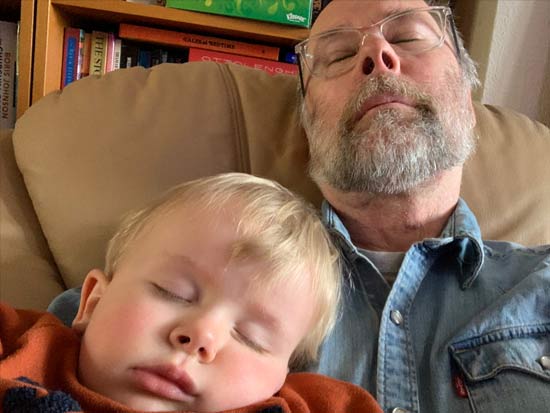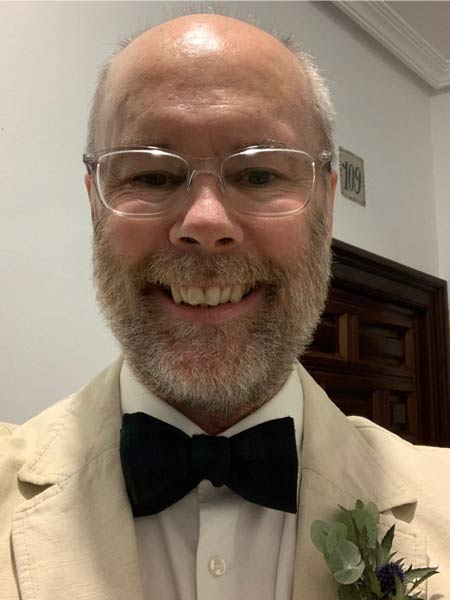I have lost count of the number of times someone has told me “I don’t know how I would cope with a cancer diagnosis.” Funnily enough, neither did I, that is, until I had my cancer diagnosis. Make no mistake, there are no “good” cancers; they are all horrible. However, there are some which are worse than others. My cancer, at least, has not killed me. It may do so eventually but it has not done it so far. That part is good, really good. My treatments have left a lasting impression, well, really a bunch of lasting impressions. I have prostate cancer, now the most common cancer among those born male – that is, overwhelmingly men but it also includes trans women among those who can develop it. Currently, on average, one in eight of those born male will develop prostate cancer in the course of their lifetime. For those of Black African or Black African Caribbean heritage, it is one in four, something that remains unexplained. Meanwhile, if a man (or trans woman) has a first degree relative with the disease, they are 2 ½ times more likely to develop it. Another complicating factor is first degree relatives with breast cancer, especially if it occurred before age 60.
Among my treatments first time around was hormone deprivation therapy. Prostate cancer is hormone-driven, so if you cut out the testosterone and you at least slow the growth of the cancer. This results in menopausal-type symptoms: hot flushes, brain fog, mood swings, emotional fragility, weepiness, weight change, and loss of muscle mass as well as a whole lot more. I was fortunate to only have six months of this as I know patients who have been on it for years and years. In fact, until relatively recently, it was the only treatment for advanced prostate cancer.
Other than hopefully controlling or slowing the disease progression, hormone-deprivation therapy does have one good point: it lets men experience the very symptoms a lot of menopausal women go through. I have jokingly said that it got me in touch with my feminine side but there is a serious point there. As a man, I could observe menopause, but I could not feel it. Thanks to my hormone deprivation therapy, I have felt it, I have compared my experience with women who have been through natural or induced menopause. Yup, we compare pretty well. What also compared well was a general lack of understanding of the condition, whether in the workplace or outside of it. I was fortunate that Catherine, my wife, has supported me in every possible way throughout my disease journey and put up well with me having menopausal symptoms and all that went with them.
I have prostate cancer in my body; we both have it in our lives
As I neared the end of my first lot of treatment, Catherine and I started doing voluntary work for Prostate Cancer UK and, both individually and together, we do awareness talks for lay groups and patient educator workshops for healthcare professionals. I have prostate cancer in my body; we both have it in our lives. The work with PCUK led to my being invited to join the trial management group of STAMPEDE, possibly the biggest and longest-running prostate cancer trial in the world, and to me being a co-author on multiple papers that have come out of the trial.
As a patient rep, I am not there as a mascot or just to represent a patient perspective. My role is to contribute fully to the design and development of the trial and its various branches and sub-studies. I am an integral part of the study design and implementation, commenting and advising on protocol revisions – currently at Version 22 – and commenting and advising on communications with trial participants. In terms of article production, I work with the other authors to collate and interpret data, and to edit, review, and approve the final report or article.
Such is the importance of STAMPEDE and my contribution to it that three of my STAMPEDE articles have been entered by the University for the latest REF, the peer reviewers in the University having rated them as 3* or 4*. STAMPEDE has changed the face of prostate cancer treatment and not only helped extend patients’ lives but also improve their quality of life. It is good to have been part of this.
I have fed my experience with prostate cancer back into my academic work and run workshops for undergraduate and postgraduate students on the disease itself and my experience of it. Anyone wanting such a workshop need only contact me and we can set something up. Although the topic is serious, the workshops are anything but lugubrious.
Currently, I am running some research projects focussed on the lived experience of persons affected by prostate cancer, which means not just the patient but those close to him. One of these projects is a Phase 1 trial in New Cross Hospital aimed at helping to improve communication between clinician and patient. Once we have proof of principle that our idea works then we will look to extending it to other hospitals in the UK and beyond.
Part of what keeps me going is the desire to help folk to be aware of what is normal for them, to get themselves checked when they get to a certain age or when normal changes, and to make an informed and authentic choice of treatment. Catching prostate cancer early improves massively the chances of being definitively cured. A great achievement is when someone comes and tells me that, having heard me speak, listened to a podcast of mine or read one of my blogs or other outputs, they have got themselves checked, or have encouraged a person close to them to do, and been treated successfully and at an early stage.
So, I am a disabled academic who lives with prostate cancer – I have several disabilities, but cancer is the only life-threatening one. Whether it shortens my life remains to be seen. After all, I could step under a bus tomorrow! What the cancer has done is give me an impetus, a drive to enhance folk’s knowledge and understanding of what it is to live with cancer, to educate them as to their own (or their friends’ and relatives’) risks of developing my kind of cancer. I want to dispel myths – such as the one where you look healthy, therefore people assume that you are healthy; or that having cancer means you have to look skeletal (that is called cachexia, and it does not happen with all cancers).
I want people to stop talking about battling or fighting cancer
If I die from my cancer, does this mean that I didn’t fight hard enough or that I lost the battle? Does it mean that the cancer won? No, the best the cancer can hope for is a draw where we both lose!
In the meantime, what is needed is not empathy. I don’t want people to “feel my pain”, largely because it is impossible to do so. Nor do I want them to feel sorry for me. I am not sorry for myself, so I don’t see why anyone else should be. Instead, what I (and my work on lived experience shows that holds true for a lot of other folk with cancer) is an understanding that, like many folk living with or after cancer, I live daily with the intermittent pain and fatigue that are among the lasting effects from the treatments I have had over the years. I also live with the dread of another relapse. I have had two already and a third is far from unlikely.
Cancer is a gift that keeps on giving. It often brings pain and suffering, but, if one is fortunate, it can bring benefits. In my case, while I would rather not have had it at all, prostate cancer has enriched my life in ways I could not have imagined. It took me into voluntary work with PCUK – not only the awareness talks and patient educator workshops with PCUK but also commenting and advising on patient information booklets and leaflets and being invited to serve on one of PCUK’s major committees – and then into STAMPEDE.
It brought me into contact with Prostate Cancer Research for whom I am now Chair of the Patient Advocacy Committee and review patient education materials, information packs as well as chairing patient panels and reviewing funding applications. It has taken me to conferences and has opened up an entire area of research that I never would have thought of venturing into. It has brought me into contact with some seriously gifted and kind individuals who work steadily for the betterment of humanity.
And, best of all, it has brought me into contact with folk who tell me that they (or someone close to them) has benefited from what I do.
When you are on the treatment treadmill, you can get very depressed.
It also took me into sourdough bread-making. When you are on the treatment treadmill, you can get very depressed. After hormone-deprivation therapy and two sorts of radiotherapy, I was feeling rather maudlin. Side effects were going off the scale and then, one day, we were channel-surfing and there was Paul Hollywood making a bloomer. “I bet I can do that,” I said to Catherine. “I bet you can,” she replied, and next day we got flour and yeast and off I went.
I was looking for something to frustrate me, which sounds odd, I know. I was frustrated by the side effects of my treatments, and I wanted the sense of agency that comes from choosing to do something myself and risking frustration. The first bread was a stunning success, so was the next and the next. No frustration for me but, instead, the sheer pleasure of eating lots of freshly baked bread. To challenge things further, I tried making sourdough starters.
The first few were total failures and just stank after a bit, but the one that was just flour and water went wonderfully as the natural yeasts and lactobacilli on the flour multiplied. I quickly moved to having one which was wholegrain rye and one that was white wheat. The resultant bread is great. Sometimes it is better than other times, but it is always really good, although my electricity bill is better not mentioned. However, my great fear is to drop one of the jars that contain sourdough starter, so I regularly share my starters with colleagues, friends and relatives. This is a form of enlightened self-interest: the recipients get some starter and I get some insurance that I can always go and ask for some back if a jar drops out my hand or explodes in the fridge.
I was initially diagnosed in September 2012. My first lot of treatment began in November 2012 and lasted until April 2013. I have since relapsed twice and had further radiotherapy in April 2019 and May 2021. As for my starters, they began in April 2013. They are still going strong, as am I.


/prod01/wlvacuk/media/departments/digital-content-and-communications/images-2024/240328-Varsity-Line-Up-Resized.jpg)
/prod01/wlvacuk/media/departments/digital-content-and-communications/images-18-19/220325-Engineers_teach_thumbail.jpg)
/prod01/wlvacuk/media/departments/digital-content-and-communications/images-2024/240515-Spencer-Jones-Award-Resized.jpg)
/prod01/wlvacuk/media/departments/digital-content-and-communications/images-2024/240320-Uzbekistan-Resized.jpg)
/prod01/wlvacuk/media/departments/digital-content-and-communications/images-2024/240229-The-Link-Resized.jpg)
/prod01/wlvacuk/media/departments/digital-content-and-communications/images-2024/240516-Andy-Gibson-Resized.jpg)
/prod01/wlvacuk/media/departments/digital-content-and-communications/images/DMHHWLVHeader.jpg)


